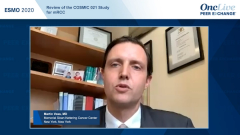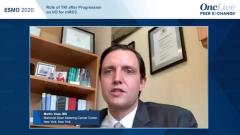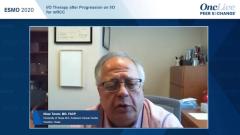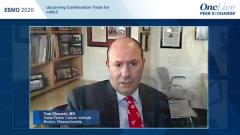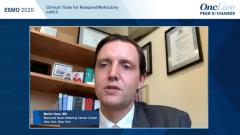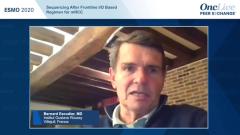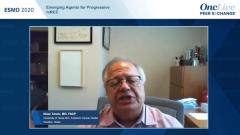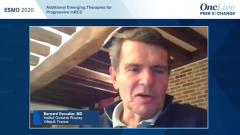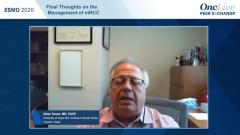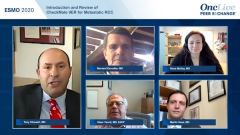
Upcoming Combination Trials for mRCC
Episodes in this series

Transcript:
Toni Choueiri, MD: Dr Escudier, what’s your vision here? Remember how we started together, you and I, 15 years ago with the shark cartilage trial? This hasn’t worked. But now we have things that work, and I would like your opinion for our audience here about 3 trials. We don’t have the results of these 3 trials. One finished accrual, 2 are accruing. How can they potentially shape the landscape of frontline therapy for metastatic RCC [renal cell carcinoma]? Let’s start with the trial that finished accrual, CLEAR. How do you think this trial will do, especially if we don't have from the first analysis an overall survival benefit?
Bernard Escudier, MD: I think…sunitinib is going to beat everolimus, so that is going to be another regimen that is going to be in the same range as pembrolizumab/axitinib and nivolumab/cabozantinib. The big surprise will be if we go to 20 months-plus PFS [progression-free survival], if we go to 80% response, I would be surprised. But that would be probably the only thing that would make me change my mind, but I think it’s going to be a toxic regimen. More toxic than nivolumab/cabozantinib and pembrolizumab/axitinib. Once again, I might be wrong. That’s what should happen here. I’m sure survival will be positive at the first interim analysis because that has been the case for all very active regimens. I would be surprised if it changes our mind. However, it’s not the same drug as cabozantinib. It’s not the same drug as axitinib. We’ll have to look at the group, especially, we have VEGF here. We have the medication with cabozantinib. We have a different drug with axitinib. I still think we will have to work on our biomarkers because we cannot say we are going to use the same regimen wherever we want. I don’t think we should.
Toni Choueiri, MD: The study that is accruing now is COSMIC-313. It’s the only study, now at least, that is accruing with a modern control arm of combination or with a non-sunitinib. Nivolumab/ipilimumab is the control and nivolumab/ipilimumab/cabozantinib is experimental arm. What do you think about the study and its positioning?
Bernard Escudier, MD: One, it has the best study design. We go against a new standard of care; that is a good design. Second, we all want to see what the triplet does. I’m still thinking that it’s going to be toxic, but toxicity is OK if we step forward in terms of activity, complete remission [CR], and that’s what I want to see. I hope we will see it. I know from my own experience that it’s more toxic than nivolumab/ ipilimumab. That’s probably one of the most important trials we have actually. We need to get these data as soon as possible to know whether we should go to a triplet. That’s a hope we all have, to cure more patients, and that’s probably the best way. We’ll see. It’s ongoing.
Toni Choueiri, MD: And how do you feel about PDIGREE? That’s an Alliance group study and gives nivolumab/ipilimumab then transitions to cabozantinib if there is progression, where the randomization between nivolumab and cabozantinib/nivolumab happens in patients who have stable disease or partial response but not CR. What do you think the place is of this regimen?
Bernard Escudier, MD: I think it’s a little premature. I don’t like the design of the study, although I know it’s a US one. I think the big question we still have, and we need a good study to do that, is should we continue with PD-1 or PD-L1 blockade after first I/O [immune-oncology therapy] here? That’s why I like the CONTACT study, which is going to come with atezolizumab/cabozantinib versus cabozantinib, because at least it’s a first phase 3, which is going to maybe answer the question of continuing. I don’t like the phase 2 of pembrolizumab/lenvatinibpost-I/O because it’s just a phase 2 and I’m still thinking we need a control arm with monotherapy here. So [PDIGREE] will give us an idea, but it’s not perfect, I prefer CONTACT-03 as the best study, which is 1-to-1.
Transcript Edited for Clarity


